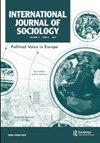Impact of Excessive Screen Time for Work Entertainment on Eyesight
IF 1.8
Q2 SOCIOLOGY
引用次数: 0
Abstract
Purpose: The study sought to investigate impact of excessive screen time for work entertainment on eyesight. Methodology: The study adopted a desktop methodology. Desk research refers to secondary data or that which can be collected without fieldwork. Desk research is basically involved in collecting data from existing resources hence it is often considered a low cost technique as compared to field research, as the main cost is involved in executive’s time, telephone charges and directories. Thus, the study relied on already published studies, reports and statistics. This secondary data was easily accessed through the online journals and library. Findings: The study found that digital eye strain is non-vision-threatening but discomfort caused due to it can have implications on overall physical, mental, and social well-being. The study highlights the increase in digital screen time during the pandemic and the resultant eye strain. There is need of spreading awareness regarding the adverse effects of digital device use and the preventive measures to safeguard our ocular health. Unique contribution to theory, practice and policy: The theory on planned behaviour was very instrumental in guiding the study, future studies can use the theory especially in shedding light on the impact of screen time on other health issues. No screen usage guidelines are there for adults till date thus our study strongly recommends that guidelines should be formulated and strictly imposed. It is also responsibility of parents to guide their children by becoming role model as well as emphasize digital etiquette. Screen time related problems are non vision‑threatening but discomfort caused due to it is gruesome in majority of population. With joint efforts of parents, policymakers, teachers, and health workers excessive screen time related issues could be superseded.工作娱乐时间过长对视力的影响
目的:本研究旨在调查过多的工作娱乐屏幕时间对视力的影响。方法学:本研究采用桌面方法学。案头研究指的是二手数据或不需要实地调查就能收集到的数据。案头调查基本上涉及从现有资源中收集数据,因此,与实地调查相比,案头调查通常被认为是一种成本较低的技术,因为主要费用是行政人员的时间、电话费和通讯录。因此,这项研究依赖于已经发表的研究、报告和统计数据。这些二手数据很容易通过在线期刊和图书馆获得。研究结果:研究发现,数码眼疲劳不会对视力造成威胁,但由此引起的不适会对身体、精神和社会健康产生影响。该研究强调了疫情期间使用电子屏幕的时间增加以及由此导致的眼睛疲劳。有必要宣传使用数码设备的不良影响和预防措施,以保障我们的眼睛健康。对理论、实践和政策的独特贡献:关于计划行为的理论对指导这项研究非常有帮助,未来的研究可以利用这一理论,特别是在揭示屏幕时间对其他健康问题的影响方面。到目前为止,还没有针对成年人的屏幕使用指南,因此我们的研究强烈建议制定指南并严格执行。父母也有责任通过成为榜样来引导孩子,并强调数字礼仪。与屏幕时间相关的问题不会对视力造成威胁,但对大多数人来说,由此引起的不适是可怕的。在家长、政策制定者、教师和卫生工作者的共同努力下,与屏幕时间过长的问题可以被取代。
本文章由计算机程序翻译,如有差异,请以英文原文为准。
求助全文
约1分钟内获得全文
求助全文

 求助内容:
求助内容: 应助结果提醒方式:
应助结果提醒方式:


